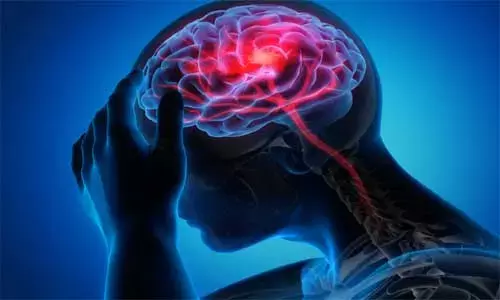- Home
- Medical news & Guidelines
- Anesthesiology
- Cardiology and CTVS
- Critical Care
- Dentistry
- Dermatology
- Diabetes and Endocrinology
- ENT
- Gastroenterology
- Medicine
- Nephrology
- Neurology
- Obstretics-Gynaecology
- Oncology
- Ophthalmology
- Orthopaedics
- Pediatrics-Neonatology
- Psychiatry
- Pulmonology
- Radiology
- Surgery
- Urology
- Laboratory Medicine
- Diet
- Nursing
- Paramedical
- Physiotherapy
- Health news
- Fact Check
- Bone Health Fact Check
- Brain Health Fact Check
- Cancer Related Fact Check
- Child Care Fact Check
- Dental and oral health fact check
- Diabetes and metabolic health fact check
- Diet and Nutrition Fact Check
- Eye and ENT Care Fact Check
- Fitness fact check
- Gut health fact check
- Heart health fact check
- Kidney health fact check
- Medical education fact check
- Men's health fact check
- Respiratory fact check
- Skin and hair care fact check
- Vaccine and Immunization fact check
- Women's health fact check
- AYUSH
- State News
- Andaman and Nicobar Islands
- Andhra Pradesh
- Arunachal Pradesh
- Assam
- Bihar
- Chandigarh
- Chattisgarh
- Dadra and Nagar Haveli
- Daman and Diu
- Delhi
- Goa
- Gujarat
- Haryana
- Himachal Pradesh
- Jammu & Kashmir
- Jharkhand
- Karnataka
- Kerala
- Ladakh
- Lakshadweep
- Madhya Pradesh
- Maharashtra
- Manipur
- Meghalaya
- Mizoram
- Nagaland
- Odisha
- Puducherry
- Punjab
- Rajasthan
- Sikkim
- Tamil Nadu
- Telangana
- Tripura
- Uttar Pradesh
- Uttrakhand
- West Bengal
- Medical Education
- Industry
intravenous cangrelor beneficial for acute ischemic stroke:Study

A small dose of intravenous cangrelor is as good as oral antiplatelets in acute ischemic stroke, suggests a study published in the Frontiers of Neurology.
Neuro-interventional procedures in acute ischemic stroke often require immediate antiplatelet therapy in the cases of acute stenting and occasionally re-occluding vessels. Intravenous cangrelor is a P2Y12 receptor antagonist with a short onset and quick offset.
A study was conducted by a group of researchers from the U.S.A. to evaluate the safety and efficacy of intravenous cangrelor in patients with acute ischemic stroke requiring urgent antiplatelet effect.
Patients who received intravenous cangrelor intra-procedurally during acute ischemic stroke treatment were identified from a prospectively collected database. Cangrelor was administered as a bolus of 15 mcg/kg, followed by an infusion rate of 2 mcg/kg/min. A historical control group consisting of anterior circulation tandem occlusions was used to compare to patients with similar lesions who received intravenous cangrelor.
Outcomes of interest included in-stent thrombosis, thromboembolic complications, intracranial haemorrhage, and functional outcomes at 90 days.
The results of the study are as follows:
- Twelve patients received intravenous cangrelor for acute ischemic stroke between October 2018 and April 2020 at a comprehensive stroke centre.
- Eleven patients had intra or extracranial stenting performed, which included two posterior circulation lesions.
- No cases of symptomatic intracranial haemorrhage were reported.
- At 90-day follow-up, two patients had died, and 10 had a good functional outcome.
- Patients with anterior circulation tandem occlusions who received cangrelor and those who received dual antiplatelets orally had similar radiographic and clinical outcomes.
Thus, the researchers concluded that low dose intravenous cangrelor is similar in safety and efficacy to oral antiplatelets in acute ischemic stroke in a small case series. Larger prospective studies on the efficacy, safety, and effect on procedure times of intravenous cangrelor in neuro intervention is warranted.
Reference:
Safety of Low Dose Intravenous Cangrelor in Acute Ischemic Stroke: A Case Series by Salahuddin H et al. published in the Frontiers in Neurology
Dr. Shravani Dali has completed her BDS from Pravara institute of medical sciences, loni. Following which she extensively worked in the healthcare sector for 2+ years. She has been actively involved in writing blogs in field of health and wellness. Currently she is pursuing her Masters of public health-health administration from Tata institute of social sciences. She can be contacted at editorial@medicaldialogues.in.
Dr Kamal Kant Kohli-MBBS, DTCD- a chest specialist with more than 30 years of practice and a flair for writing clinical articles, Dr Kamal Kant Kohli joined Medical Dialogues as a Chief Editor of Medical News. Besides writing articles, as an editor, he proofreads and verifies all the medical content published on Medical Dialogues including those coming from journals, studies,medical conferences,guidelines etc. Email: drkohli@medicaldialogues.in. Contact no. 011-43720751


